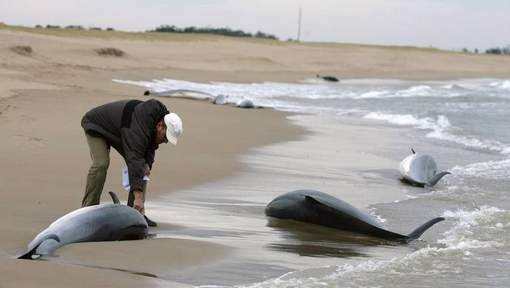Mass Dolphin Strandings Off Peru's Coast
Today’s guest blogger is Antonio Carrera, Heal the Bay’s Network Administrator.
So far this year, more than 3,000 dolphins have been found dead along 66 miles of beaches in the Lambayeque region, according to the president of the Association of Fishermen of Puerto Eten, Niquen Francisco. The representative of the Chaparrí Ecological Reserve, Heinz Plengue, indicated that about 500 dolphins were found stranded in recent days along the 22 miles of Palo Parado beach, opposite the island of Lobos de Tierra, in Mórrope.
Carlos Yaipen Llanos, director of ORCA Sciences, believes the dolphin deaths could be due in part to seismic testing that occurs during oil exploration. Oil companies apply the use of sonar frequencies for exploration of minerals in the seabed, generating high frequency noises that can damage the eardrums of dolphins and can cause their death.
“Oil companies use different frequencies of sound waves, and the effects are not visible to the naked eye, they generate after effects in animals that can cause death, not only in dolphins, but also sea lions and whales,” he said. Yaipen added that the noise impact generated loss of balance, disorientation and internal bleeding in the animals.
Another theory brought forth by Jorge Torres Cabrejos, the president of the Aquaculture Association of Lambayeque, is that the dolphins might have consumed anchovies killed by effects of eating decomposed plankton floating in the water as a result of heavy pollution in the area.

U.S. laws, like the Marine Mammal Protection Act, are designed to protect all marine mammals, including several species of dolphins and their habitats, from threats that may harass these sensitive animals or cause death. Sonar has long been seen as a threat to several species of marine mammals, and several groups like Earthjustice and NRDC are involved in ongoing litigation regarding military use of sonar in California.
Heal the Bay has also worked for stronger marine mammal protections. We joined several environmental groups in opposing the proposed Liquefied Natural Gas terminal that would have been sited off the coast of Malibu in 2006 -07 because of concerns regarding noise impacts to marine mammals. More recently, we raised concerns to the State Lands Commission about operations that may negatively impact marine mammals at the Chevron Marine Terminal. We advocated for Chevron to implement safeguards to prevent ship strikes (e.g. use of trained observers, slower ship speeds around marine mammals, etc.). These recommendtions were included in the final permit issued to Chevron.


